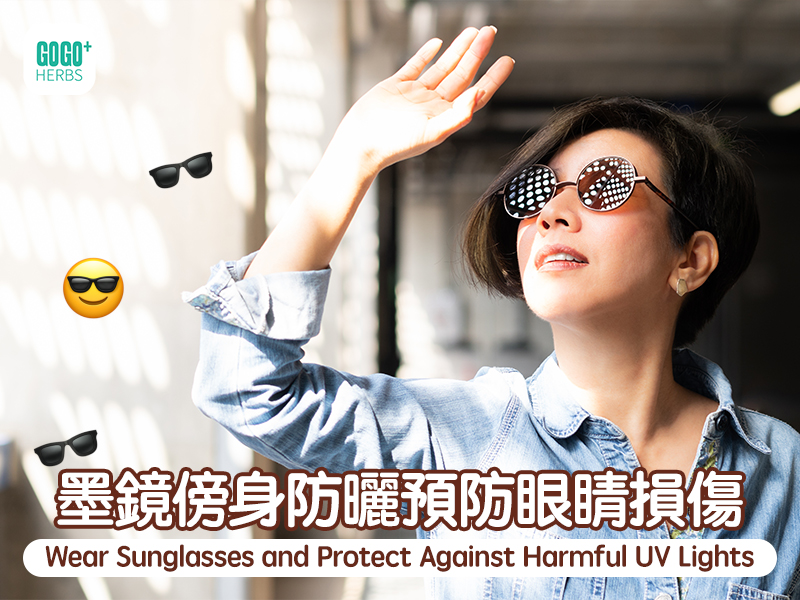In order to prevent skin aging, women have always attached importance to sunscreen and UV protection, and it has become common knowledge to apply sunscreen when going out on a sunny day. However, many people may overlook the fact that the damage caused by UV rays to the human body is not limited to the skin, and if you ignore it, you may not be able to protect your skin from UV rays.Sun Protection for EyesThe consequences are not to be underestimated. UV rays can cause corneal burns, stinging, redness and other discomforts. With prolonged exposure, the pigment cells on the surface of the eyeballs may build up due to the stimulation of sunlight, resulting in the so-called "inking" phenomenon. Worse still, the lack of eye protection over a long period of time will significantly increase the risk of macular degeneration, cataract and pterygium. Ophthalmologists have come across such cases: a patient in his forties developed serious cataracts because he had not paid attention to sun protection for a long time. This shows that it is important to have a pair of sunglasses to protect your eyes from the sun when you are outdoors.
Whether it's skiing in the snow in winter or enjoying the sun at the beach in summer, Hong Kong people love outdoor activities. However, ophthalmologist Dr Lee Ka Yau points out that the two types of venues, namely the beach and snow, are precisely the areas with strong mirror reflection, and the need for eye protection is even more urgent - the ultraviolet rays in the sunlight can cause different degrees of damage to the eyes. In the short term, it may directly cause eye burns; in terms of long-term cumulative effects, it may trigger macular degeneration of the fundus of the eye, causing the lens in the eye to turn yellow and cloudy, and eventually develop into cataracts, and it may also lead to pterygium hyperplasia on the surface of the eye. Like fishermen, farmers and other people who work outdoors for a long time, there are many cases of serious cataracts in their forties due to neglecting sun protection for the eyes.
In the structure of the eye, the macular area of the retina is the key part of the eye that collects visual information. Once macular degeneration occurs, it will seriously affect the central vision. Dr Lee has explained: if we compare the eye to a camera, the lens is the lens, the retina is the negative, and the macula is the centre of the negative. Although macular degeneration does not cause total blindness, it has a significant impact onVisual FunctionsThe damage to the retina is so severe that patients often experience "clear peripheral photos but blurred key areas in the centre". In addition to this, patients may experience a slow loss of central vision, distortion of vision, etc. Once the damage to the retina reaches a certain level, it is very difficult to fully restore vision.
The damage to the eye from UV rays doesn't stop there, it continues to damage the lens inside the eye. After years of exposure, the lens proteins may undergo biochemical changes and gradually lose their transparency, which is the typical cause of cataract. Pterygium is a growth that extends from the corner of the eye towards the pupil. It looks like a piece of flesh growing out of the white of the eye, which not only affects vision, but may also cause a cataract.blurred visionIf not treated in time, the symptoms may worsen. In addition, people who are frequently exposed to sunlight may develop "conjunctival nevi" due to pigmentation of the white part of the eyes. These nevi are mostly black or brown in colour, and their sizes and locations are not fixed, and although they do not have a significant effect on vision, they may affect their appearance to a certain extent.
As an important tool to protect your eyes from ultraviolet rays, there are many considerations when choosing sunglasses. Dr Lee suggests that when choosing sunglasses, priority should be given to those with "UV400" sun protection (i.e., capable of blocking ultraviolet rays of wavelengths up to 400 millimetres) or "UV100%" sun protection (i.e., blocking 100% of ultraviolet rays), and that the wider the lens coverage, the better the protection effect. In response to the popular saying that "the darker the colour of the sunglasses lens, the better the UV protection effect", Dr. Lee stressed that: under the premise of the UV protection function, the colour of the lens does not affect the UV filtration effect, but only brings different visual chromatic aberration experience, the public can be based on different outdoor sports scenes, to choose the appropriate colour of the lenses. He also reminded the public to be wary of substandard sunglasses - not only do they fail to block UV rays effectively, but the darkening of the light caused by the lenses will lead to natural pupil dilation, which will ultimately lead to more UV rays being absorbed by the eyes without the eyes knowing it, resulting in more serious injuries.


